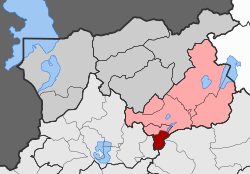This is an old revision of this page, as edited by Markussep (talk | contribs) at 14:50, 4 March 2024 (population update, reference). The present address (URL) is a permanent link to this revision, which may differ significantly from the current revision.
Revision as of 14:50, 4 March 2024 by Markussep (talk | contribs) (population update, reference)(diff) ← Previous revision | Latest revision (diff) | Newer revision → (diff) Settlement in Greece| Variko Βαρικό | |
|---|---|
| Settlement | |
  | |
| Coordinates: 40°32.30′N 21°30′E / 40.53833°N 21.500°E / 40.53833; 21.500 | |
| Country | Greece |
| Administrative region | West Macedonia |
| Regional unit | Florina |
| Municipality | Amyntaio |
| Area | |
| • Total | 21.9 km (8.5 sq mi) |
| Elevation | 770 m (2,530 ft) |
| Population | |
| • Total | 508 |
| • Density | 23/km (60/sq mi) |
| Time zone | UTC+2 (EET) |
| • Summer (DST) | UTC+3 (EEST) |
| Postal code | 500 05 |
Variko (Template:Lang-el, Bulgarian/Template:Lang-mk) is a village and a former community in Florina regional unit, West Macedonia, Greece. Since the 2011 local government reform it is part of the municipality Amyntaio, of which it is a municipal unit. The municipal unit has an area of 21.877 km. It is 27 km south-southeast of the city of Florina. The population in 2021 was 508. The village's primary agricultural products are beans, corn, and wheat. There is an annual bean festival on August 15, coinciding with the Dormition of Virgin.
History
The village was first mentioned in an Ottoman defter of 1481, under the name of Mokreni, and was described as having sixty-nine households. In the beginning of 19th century Francois Pouqueville noted Mocrena as one of the Bulgarian villages in the region. The population of Mocreni was Bulgarian in 19th and early 20th centuries. The population of the village was under the supremacy of the Bulgarian Exarchate since 1891.
The village was burned by the Turks during the Ilinden Uprising. There was a Bulgarian school in the village in the beginning of the 20th century. After the Treaty of Bucharest in 1913, when the area became part of Greece, many people emigrated to Bulgaria. The village was renamed Variko in 1926.
After the defeat of Greece by Nazi Germany in April 1941 in the village was formed a club of the Bulgaro-Macedonian Central Committee and in 1943 a detachment of the Bulgarian paramilitary organization Ohrana. The village suffered greatly during the Greek Civil War, when many villagers emigrated abroad.
Notable persons
- Nikola Andreev, (1879 - 1911) - Bulgarian teacher and voivode
- Nikola Milev, (1881-1925) - Bulgarian historian
Demographics
According to the 2011 census, the population of Variko was 638 people. Today, the village has a mixed population of Greeks and Slav Macedonians (around 11,7%).
Literature
- "Мокрени (моето родно село)" A book by Anastas Simeonov, the son of the revolutionary Simeon Krstev Siin, about the history of Mokreni (his home village) - In Bulgarian. 1931
Notes
- "Αποτελέσματα Απογραφής Πληθυσμού - Κατοικιών 2021, Μόνιμος Πληθυσμός κατά οικισμό" [Results of the 2021 Population - Housing Census, Permanent population by settlement] (in Greek). Hellenic Statistical Authority. 29 March 2024.
- "ΦΕΚ B 1292/2010, Kallikratis reform municipalities" (in Greek). Government Gazette.
- "Population & housing census 2001 (incl. area and average elevation)" (PDF) (in Greek). National Statistical Service of Greece.
- Kravari, Vassiliki (1989). Villes et villages de Macédoine occidentale. Réalités byzantines (in French). Vol. 2. Paris: Editions P. Lethielleux. p. 301. ISBN 2-283-60452-4.
- Pouqueville, F.C.H.L. Travels in Epirus, Albania, Macedonia, and Thessaly, London 1820, p.88
- Шопов, Атанас. Из живота и положението на българите във вилаетите, Пловдив, Търговска печатница, 1893, стр. 232 - 233.
- Brailsford, Henri N. Macedonia: Its races and their future, London, 1906. p. 216, Rappoport Alfred. Au pays des martyrs. Notes et souvenirs d'un ancien Consul Général d'Autriche-Hongrie en Macédoine (1904-1909), Paris 1927; in Bulgarian - Рапопорт, Алфред. В страната на мъчениците, София 2002
- D.M. Brancoff. La Macedoine et sa Population Chretienne. Paris, 1905, pp. 180-181.
- Добрин Мичев. Българското национално дело в Югозападна Македония (1941 – 1944 г.)
- Николов, Борис Й. Вътрешна Македоно-Одринска революционна организация. Войводи и ръководители. биографично-библиографски справочник. София 2001, с. 9 (Nikolov, Boris. Internal Macedonian-Adrianople Organization. Voivodes and Leaders. Biographical and Bibliographical Reference Book. Sofia 2001, p. 9).
- Чолов, Петър. Български историци. Биографично-библиографски справочник. София 1999, с. 182 (Cholov, Petar. Bulgarian Historians, Biographical and Bibliographical Reference Book. Sofia 1999, p. 182); Марков, Георги. Покушения, насилие и политика в България 1878-1947. София 2003, c. 216-218 (Markov, Georgi. Attempts, Violence and Politics in Bulgaria 1878-1947. Sofia 2003, pp. 216-218).
- Cite error: The named reference
census11was invoked but never defined (see the help page). - In the 2014 European elections in Greece, 82 people from Variko voted for the Rainbow Party, which represents the ethnic Macedonian minority in Greece.
| Subdivisions of the municipality of Amyntaio | |
|---|---|
| Municipal unit of Aetos |
|
| Municipal unit of Amyntaio | |
| Municipal unit of Filotas | |
| Municipal unit of Lechovo | |
| Municipal unit of Nymfaio | |
| Municipal unit of Variko | |